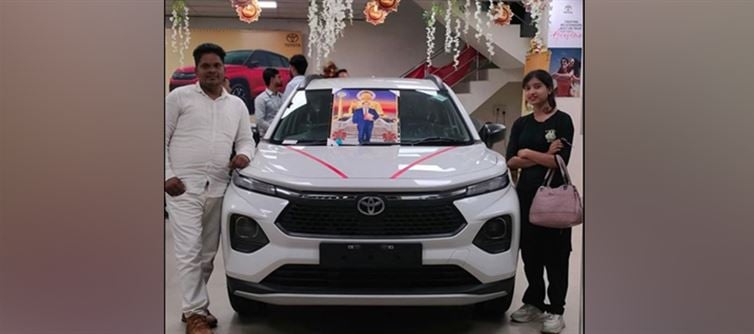
🚗 THE toyota PARADOX
A picture says a thousand hypocrisies.
A recent image circulating online — showing someone buying a brand-new toyota while lamenting the inability to afford a ₹100 UPSC exam form or college fees — has become a metaphor for India’s twisted moral math.
It’s more than a meme.
It’s a mirror — reflecting how privilege, politics, and selective morality collide in the world’s largest democracy.
This isn’t about one car. It’s about a system that rewards contradiction: people wealthy enough to buy luxury goods still claiming victimhood; communities entrenched in advantage demanding perpetual protection; and a nation too afraid to call out the new aristocracy of entitlement.
🧠 SECTION 1: FROM NEED TO STRATEGY — WHEN RESERVATION BECAME AN INHERITANCE
India’s reservation system was born out of historical necessity.
It was meant to repair centuries of social injustice — a moral debt owed to those long excluded from education, power, and dignity.
But somewhere along the decades, the moral line blurred.
What began as a ladder for the oppressed turned into a lifelong elevator for the already uplifted.
Generations later, those who’ve reaped the benefits — elite colleges, government jobs, urban prosperity — often refuse to step aside, shielding their inherited advantage behind the same policy once designed for their ancestors’ emancipation.
Social justice became a status symbol, not a social responsibility.
💸 SECTION 2: THE UPSC FORM AND THE PRICE OF HONESTY
The UPSC exam form costs ₹100.
In India’s currency of excuses, that’s less than a cup of coffee — but it’s become a political lightning rod.
The viral argument goes like this:
“How can someone who can afford a car, smartphone, or gold jewelry claim they can’t afford ₹100 to chase their dream?”
It’s not just rhetorical. It exposes a psychological economy of entitlement, where poverty is no longer a condition — it’s a performance.
Being seen as disadvantaged brings more social leverage than being seen as responsible.
The ₹100 form isn’t the issue.
It’s the moral bankruptcy behind pretending to be powerless while living in privilege.
🏛️ SECTION 3: THE COMFORTABLE REVOLUTION — WHEN THE MIDDLE CLASS WEARS VICTIMHOOD
Today’s urban elite has mastered the art of dual identity.
They are Instagram-rich but policy-poor, driving SUVs to coaching classes, uploading “struggle” reels while sipping frappes, and demanding systemic sympathy.
They protest meritocracy when it doesn’t suit them — but invoke it when others rise.
They decry “unfairness” in exams but conveniently ignore the social and financial safety nets cushioning their lives.
This is not a revolution.
This is performance activism — outrage outsourced to social media, empathy limited to hashtags, and accountability deflected through ideology.
⚖️ SECTION 4: THE INJUSTICE WITHIN JUSTICE
Let’s be clear — reservation remains vital for millions who still face real deprivation.
But it loses its moral core when the privileged hide within its shadow.
The idea was to lift the weakest up, not to let the strong hoard benefits under the same label forever.
When success stories cling to perpetual protection, the ladder of justice becomes a fortress of hypocrisy.
The real tragedy?
Those who still need help — the children in villages, the families without access to schools or networks — are drowned out by the noise of those gaming the system in designer shoes.
🔥 SECTION 5: THE NEW PRIVILEGE — WHEN ENTITLEMENT BECOMES A LIFESTYLE
Privilege in india no longer wears suits — it wears self-pity.
It doesn’t flaunt arrogance — it flaunts “struggle.”
The same people who buy cars worth ₹15 lakh cry foul over ₹100 forms, playing both the victim and the victor depending on convenience.
And society applauds it — because outrage sells better than honesty.
This is how moral inflation works:
The more we fake disadvantage, the more we devalue real suffering.
🧭 SECTION 6: INDIA’S REAL TEST ISN’T UPSC — IT’S INTROSPECTION
The question isn’t whether reservations should exist — it’s who should use them, and when they should end.
At what point does justice for the past become injustice in the present?
At what point does equality mean letting go of crutches you no longer need?
If a person can buy a toyota, they don’t need sympathy — they need self-awareness.
If an educated, wealthy family still claims reservation, they’re not victims — they’re participants in systemic deceit.
🕊️ CONCLUSION: FROM car KEYS TO CONSCIENCE
That viral image wasn’t just an internet moment — it was a national wake-up call.
Because every time someone drives a ₹15 lakh car and cries poverty to dodge effort, a poorer child loses a seat, a dream, a chance.
Every time we confuse entitlement with empowerment, we chip away at the foundation of fairness.
It’s time to stop performing weakness and start practicing integrity.
You can’t drive a toyota and call yourself oppressed.
You can’t buy privilege and rent morality.
And you definitely can’t have it both ways — not if you still believe in justice.




 click and follow Indiaherald WhatsApp channel
click and follow Indiaherald WhatsApp channel